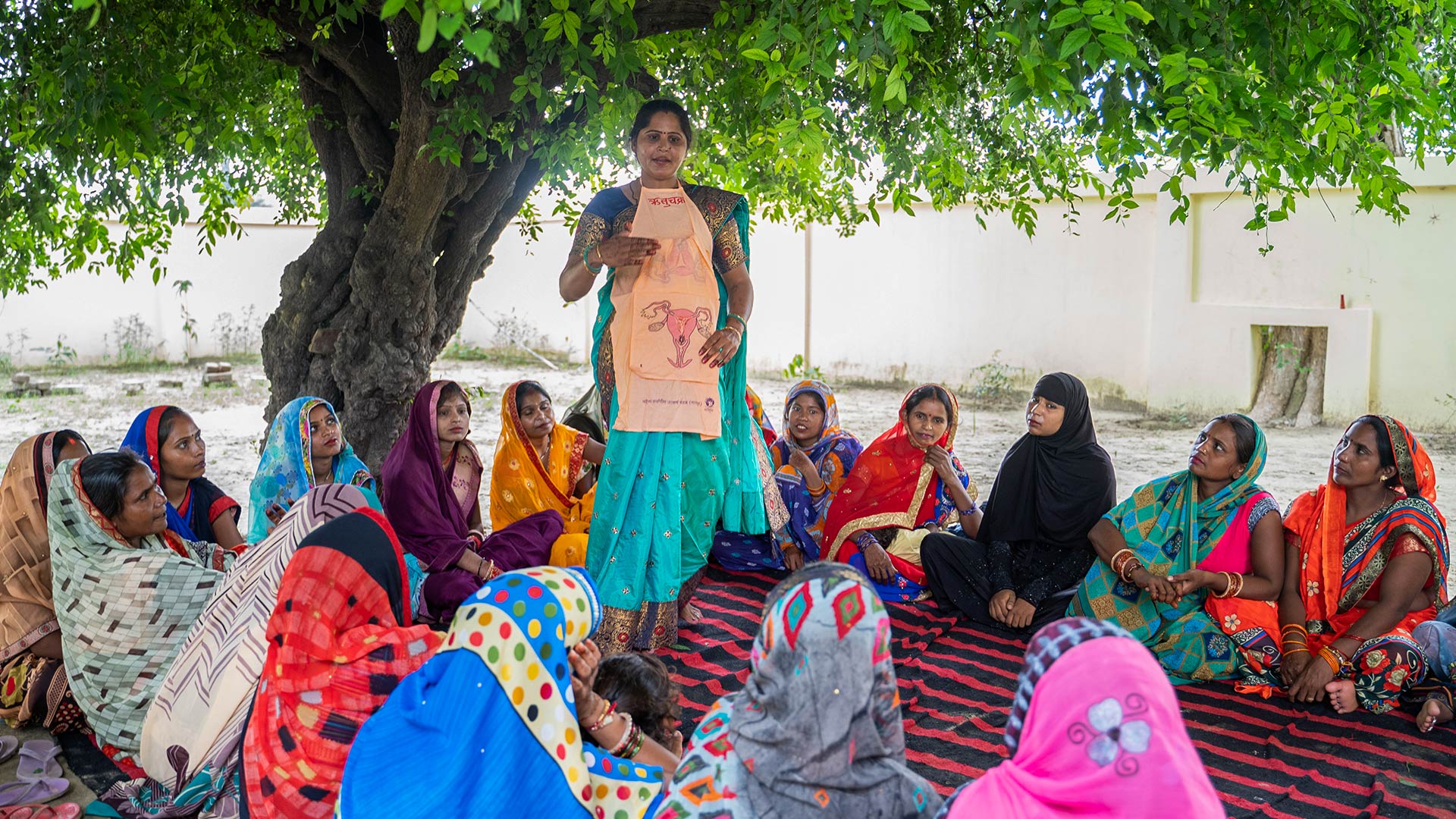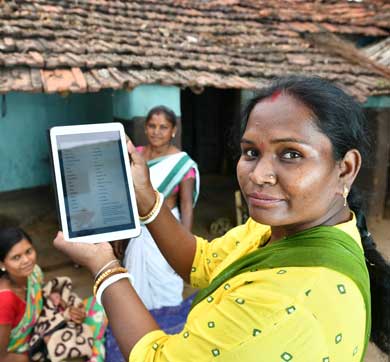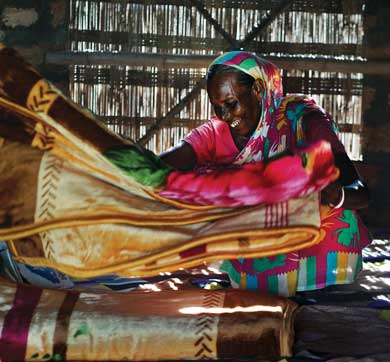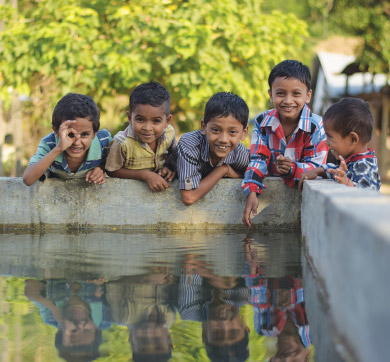March 2024 | 1767 words | 7-minute read
Champaben Solanki was raised thinking menstruation was the ‘curse of God’. The 35-year-old from Gujarat’s Dahod district had to endure purification with cow urine and rigid isolation during her menstrual cycle. “For five days a month, I was not allowed to touch kitchen utensils,” she says. “I had to sit outside and use a separate plate to eat on.” In Indrathana village in Maharashtra’s Yavatmal district, Vaishali Aatram, 23, also faced restrictions on social interactions, mobility, food consumption and religious worship that inevitably followed the onset of her period.
A quarter of India’s ~1.4 billion population is constituted of menstruating girls and women — and their stories of social challenges and ostracism cut across caste, class, geography and age. The deeply entrenched stigma around menstruation has long been a barrier to safe and effective menstrual health and hygiene management (MHM). However, since Tata Trusts initiated its MHM programme in 2018, Ms Solanki and Ms Aatram are among the over 2.5 lakh women and girls who have gained the knowledge and tools to effectively manage their menstrual health and hygiene.
The Trusts’ MHM programme has made significant inroads, in large part because it is informed and influenced entirely by women. “Women are one of the core target groups of the Tata Trusts’ WaSH (water, sanitation and hygiene) initiative, which addresses personal hygiene issues as part of its thematic interventions,” says Divyang Waghela, Head, WaSH, Tata Trusts. “The need for this programme rose from the feedback the team received from women while implementing its extensive water and sanitation projects, including the significant challenges they faced in managing menstruation because many households lacked toilets or bathrooms and running water.”
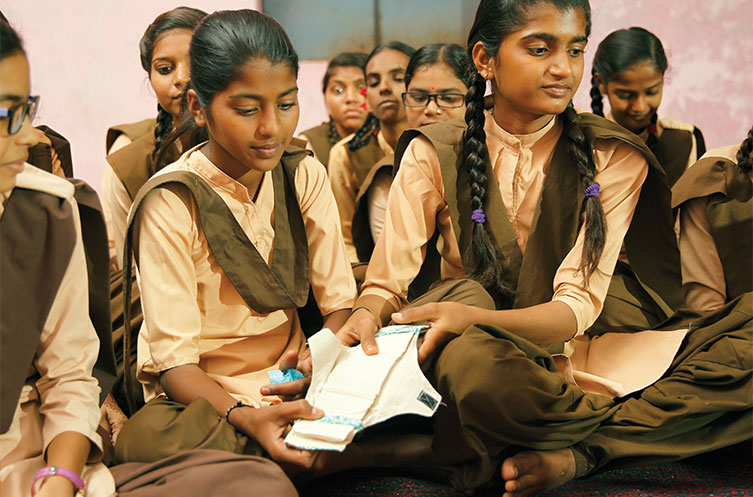
Breaking barriers
Since its inception, the programme has grown to cover 1,400 villages across 27 districts in 8 states, including Rajasthan, Gujarat, Maharashtra, Karnataka, Assam, Uttar Pradesh, Uttarakhand and Jharkhand. Its vision is to promote improved MHM practices and help build a socio-cultural environment that aids women and girls in managing menstruation with dignity. Key to this vision was interpreting and intercepting barriers, including:
- Lack of proper knowledge about menstruation/natural physiological processes
- Social stigma and cultural beliefs and taboos
- Inadequate access to safe, affordable and sustainable menstrual hygiene products
- Low access to water, sanitation, hygiene and disposal facilities
According to the report Menstrual Hygiene Preparedness Among Schools in India in the International Journal of Environmental Research and Public Health (2020), less than half of girls in India were aware of menstruation before their first period. “For lakhs of girls and women, their ability to manage menstruation hygienically is heavily compromised due to low awareness and socio-cultural taboos,” says Mr Waghela. “Thus, inter-generational transfer of myths and taboos is one of the key challenges the Trusts is focusing on.”
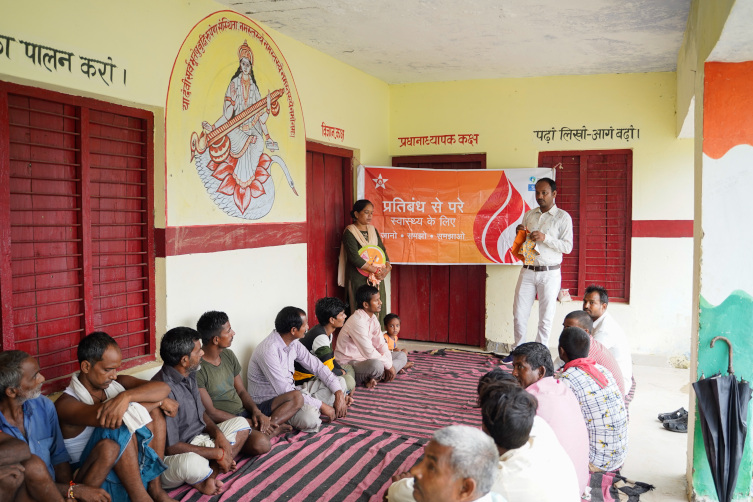
As per the National Family Health Survey 2019-21 (NFHS-5), there has been an improvement in the percentage of women aged 15-24 who use a hygienic method of menstrual protection. It has risen from 58% (as per NFHS-4 in 2015-16) to 78%. However, only 73% of rural women use a hygienic method as compared to 90% of women in urban areas, and women with 12 or more years of schooling are more than twice as likely to use a hygienic method compared to those with no schooling. Also, a few states continue to have lower than average access to hygienic methods, highlighting the need for targeted initiatives to improve practices in these regions.
Poor access to menstrual hygiene products, water and sanitation have a demonstrated impact on women’s health, leaving them susceptible to reproductive tract infections (repeated instances put them at risk of cervical cancer) and compelling girls to miss school or drop out.
The Trusts’ holistic approach in facilitating change is presented through its EPIC model:
- Encouraging equitable gender norms through behavioural change
- Promoting social entrepreneurship
- Inculcating safe and hygienic habits
- Creating awareness for responsible disposal
Across the Tata group
Companies across the group have also initiated MHM programmes as part of the Trusts’ WaSH initiative.
- Through Project Jalodari in Assam, Tata Consumer Products has supported 3,500+ women and adolescent girls with education on menstrual hygiene and reached 4,000+ adolescent girls through its MHM programme in Jharkhand.
- As part of its Integrated Sanitation Project, Voltas conducts workshops in villages around its Waghodia plant in Gujarat, to raise awareness of MHM. Through 900+ training sessions, over 2,800 women and adolescent girls have been educated.
- The MHM initiative of Tata Power’s Urja programme has impacted 200+ beneficiaries and its Sehat Mitra and Arogya initiatives aim to improve the health of women and adolescent girls through education and the facilitation of hygienic menstrual practices.
Educating women — and men
The MHM programme creates awareness through sessions that teach women and girls about their bodies, reproductive systems, the biology of menstruation, and how to manage menstruation effectively. They are also provided information on nutrition and menstrual management products.
Most significantly, the programme encourages women to start dialogues with their partners through couples counselling sessions. “Since we are focused on creating societal, household and individual-level change, we have developed counselling modules for adolescent boys and couples,” says Mr Waghela. “The module for adolescent boys focuses on male puberty and touches upon menstruation. The module for men encourages conversation among male family members, with the aim of creating an understanding of menstruation as a normal biological process and start providing support to female family members in managing menstruation with dignity.”
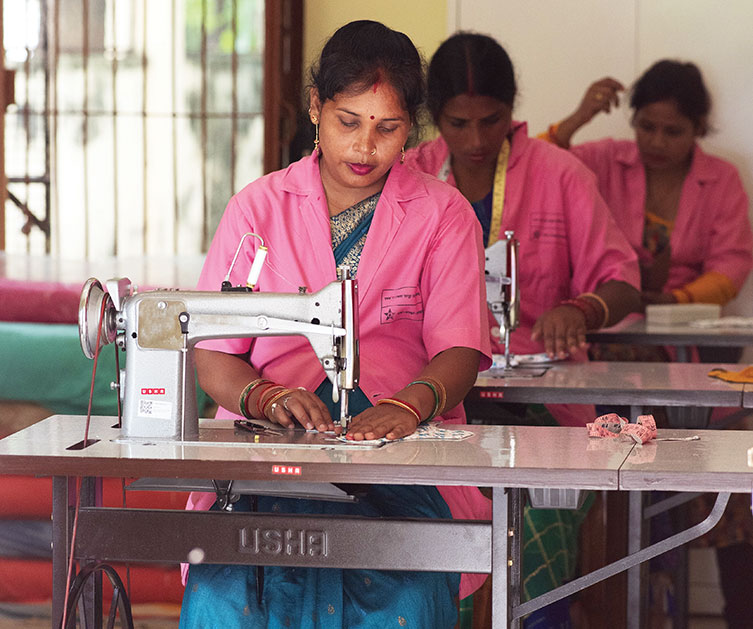
However, firmly established attitudes are a challenge. Volunteers encounter disinterest and, in some cases, threats of violence for discussing menstruation. To counter this, the Trusts collaborates with 400+ community resource persons (or CRPs, often known as sakhis), with whom women, men and village elders are comfortable discussing a taboo subject.
Apart from CRPs and 10,000 frontline workers, Tata Trusts also partners with teachers in 750+ village and district level schools to conduct MHM sessions in classrooms. The intent is to encourage girls to speak to their mothers about menstruation, provide information on products available and adoption of hygienic practices. It is hoped that these will have a trickle-down effect, leading to peer educators within schools.
Building infrastructure
The MHM programme is sustained through the efforts of multiple stakeholders. At the community level, it involves the approval of gram panchayats, village elders and school authorities, and at the government level, it calls for engagement with the Health and Family Welfare, Women and Child Development, Water and Sanitation, Rural Development, and Education departments. Initiatives include collaborating with district- and block-level officials to set up health camps; providing training and reference materials to ASHAs (accredited social health activists) and Anganwadi workers, and conducting workshops for government departments, NGOs and academic institutions to drive greater public discourse.
Stakeholder buy-in becomes even more important when WaSH facilities — like girls-only toilets with water taps and facilities for disposal of menstrual products — are needed in schools. In this case, the programme also provides technical support, like educating stakeholders on how to make a toilet an MHM-friendly one.
Impact report
The MHM programme covers 1,400 villages, across 27 districts, in 8 states. It has:
- Impacted the lives of 2.5 lakh women and girls; influenced 6,000 men and boys
- Reached students in 750+ schools
- Built capability by training 400+ sakhis (community resource persons) and 10,000 frontline workers
- Enhanced well-being and empowerment through 50,000+ awareness sessions
- Helped establish a supply chain through social micro-entrepreneurs that has supplied 1 lakh+ reusable pads
In three districts in Uttar Pradesh, the Trusts took infrastructure development a step further with the Happy Period Rooms model. The pilot, started in April 2022, provides schoolgirls a safe space to change and store their menstrual absorbents. Equipped with basics like a dustbin, mug, bucket, storage box and informational charts, including a period calendar, these 13 rooms are sustained through training and orientation of teachers and students. Similar infrastructure is also being developed in other states.
Social entrepreneurship
Providing access to sustainable absorbents is another key pillar of the MHM programme. It has developed a supply chain for sustainable sanitary pads, which has led to the creation of community livelihoods. CRPs reach out to local, women-led self-help groups (SHGs) to set up units for stitching reusable pads. The MHM team offers initial support, where necessary, to the micro-entrepreneurs.
The Trusts also offers skill training workshops that teach these women SHGs to stitch washable and reusable menstrual pads using safe, sustainable and easily available materials. They are then encouraged to sell these reusable cloth pads directly and through local shops. Over 10 cloth pad production units are running in Uttar Pradesh, Rajasthan, Maharashtra and Assam, and have supplied 1 lakh+ reusable pads so far.
During the pandemic, which made field visits impossible, the MHM team improvised and created an animated video, How to Stitch Your Own Cloth Pad, to make women self-reliant. CRPs circulated the video through WhatsApp and other channels.
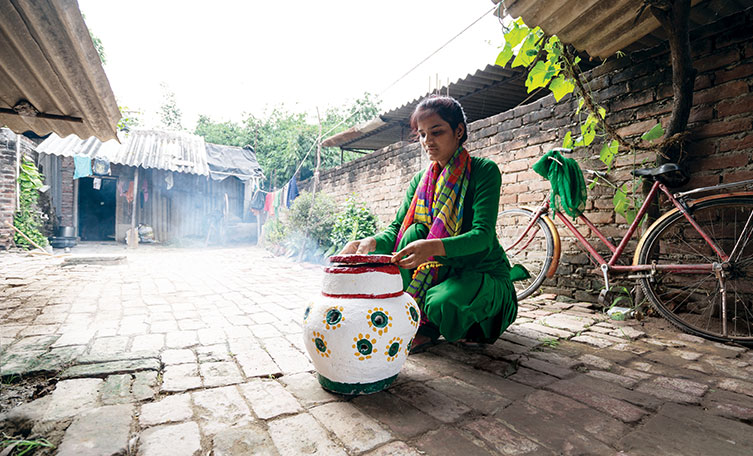
Facilitating sustainable disposal
As adoption of safe absorbents rises, there is an urgent need for sustainable disposal methods, especially of branded products that are non-compostable. Many women and girls are unaware of how to segregate and dispose used products in a safe and effective manner. MHM’s knowledge-building sessions encourage women to make choices based on factors other than cost, and adoption of menstrual waste management methods, like composting, low-cost incineration and biomedical incineration. In some communities, the programme has introduced matka incinerators, for safe and controlled disposal. The affordable, innovative earthen pot can be installed near one’s home, thus ensuring privacy, and the smoke and ash generated are absorbed by the soil, preventing litter.
Partnering for growth
While Tata Trusts has made significant inroads through its MHM programme, in the longer term, it is focused on two aspects. “Firstly, through policy and advocacy, we want to contribute to the larger sector and support key stakeholders, such as the government, in mainstreaming MHM in schools and communities,” says Mr Waghela. “To achieve this, we will provide technical assistance to concerned government departments such as Women and Child Development, Health, Education, etc, so that the MHM programme can be linked to their interventions. And, secondly, we will help develop a larger programme through networking with civil society organisations to create a momentum in the MHM space, with a focus on adolescent health.”
—Anuradha Anupkumar




